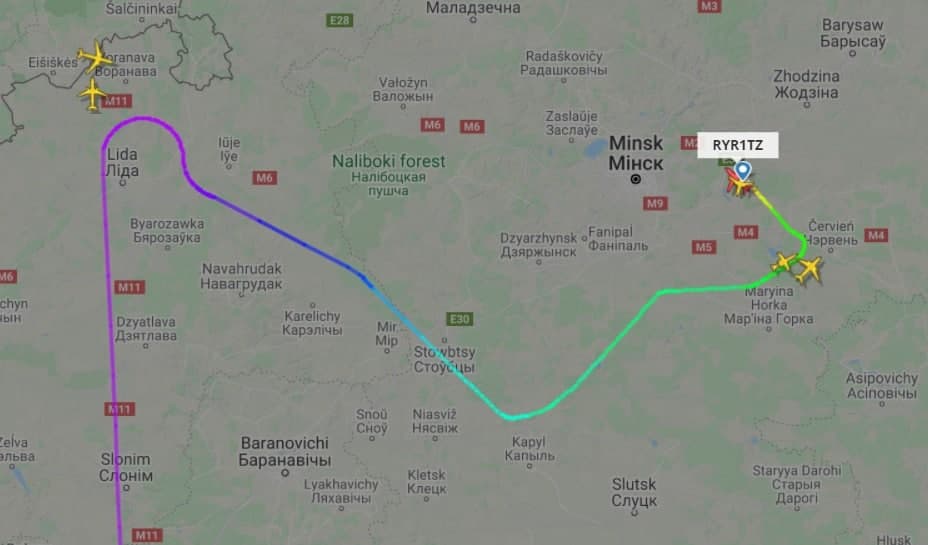MINSK
Western countries, led by the European Union, made a determined effort to take a serious stand on punishing Belarus with new sanctions after a commercial flight was diverted to Minsk and a dissident journalist on board was arrested.
Roman Protosevich, 26, was detained, along with his Russian partner. He was shown on state television saying he was in good health, had been treated well by security forces and apparently confessing to crimes of inciting riots — opposition activists said he was acting under duress.
EU leaders at a summit in Brussels denounced the diversion of the Irish Ryanair aircraft heading from Greece to Lithuania as “state piracy”. They banned the Belarusian state airline Belavia from EU airports and told European airlines to avoid Belarusian airspace. Many had already taken such action.
Leaders were also considering further economic sanctions, though that could prove more complicated.
The row was also creating diplomat ripples — Belarus and the neighbouring Baltic state of Latvia each threw out the other’s diplomats.
Belarusian President Alexander Lukashenko, accused of numerous rights abuses during more than 25 years in power, is already subject to travel bans and financial sanctions linked to brutal police action against demonstrators who denounced his re-election last year as rigged.
“We’re talking about a European plane from an EU airline that was flying between two capitals of the European Union, so it’s an act of state piracy that can’t remain unpunished,” Clement Beaune, France’s Minister for European Affairs, told BFM TV.
U.S. President Joe Biden denounced “a direct affront to international norms” and “an outrageous incident”.
The opposition telegram channel Nexta, where Protosevich was once an editor, sounded an optimistic note: “It appears that the situation with the aircraft prompted Europe to, at long last, move towards more decisive action,” it wrote.
But sanctions have not proved particularly effective against Belarus — or Russia, its main ally and benefactor to the east.
Lukashenko has shrugged off punitive measures and has grown more reliant on Moscow — while bein insistent on Belarus’s sovereignty and very cautious about Kremlin leader Vladimir Putin’s call for implementation of a longstanding “union state”.
Western sanctions slapped on Kremlin leader Vladimir Putin over Russia’s 2014 annexation of Crimea have also had little effect.
Russia, perhaps predictably, refused to denounce the action against the Irish aircraft.
Russian Foreign Minister Sergei Lavrov said Belarus had treated the incident with an “absolutely reasonable approach”.
“It is shocking that the West calls the incident in Belarusian airspace shocking,” Foreign Ministry spokeswoman Maria Zakharova said, referring to muted reactions in the West to previous plane diversions.
Belarusian officials were unrepentant, sticking to their version of events that the Palestinian group Hamas had threatened to detonate a bomb on the plane — though Hamas denied all involvement.
At the height of last year’s rallies denouncing Lukashenko’s re-election to a sixth term as fraudulent, more than 100,000 protesters massed in Minsk and other Belarusian cities. But police action — and the detention of more than 30,000 demonstrators — crushed the protest movement.
Svetlana Tikhanovskaya lost the election to Lukashenko but now calls herself the legally elected president from exile in Lithuania where many opposition figures now live. She spoke on Monday to U.S. National Security Adviser Jake Sullivan who pledged to “hold the Lukashenko regime to account.
One of her top lieutenants said Lukashenko had made a “huge mistake” by diverting the aircraft and had only a detained journalist to show for it.
“I think he will be regretting it. For months Belarus was lost on everyone’s agenda. Now Lukashenko has made sure that Belarus is everywhere,” Franak Vyachorka told CBC radio. “I think this is not the reaction he intended to get. He is very wrong when he thinks there will be impunity.”
The mutual expulsion of diplomats with Latvia was sparked by a passion shared by both countries — ice hockey. Latvia is staging the world championship after sports authorities denied Belarus the right to co-host the tournament, citing the repression of demonstrations and Belarus’s record in fighting the Covid pandemic.
Riga Mayor Martins Stakis replaced Belarus’s Soviet-style flag at the championship with the banned historic standard used by the opposition. Belarus responded by throwing out all but one Latvian diplomat and Latvia retaliated in kind.

